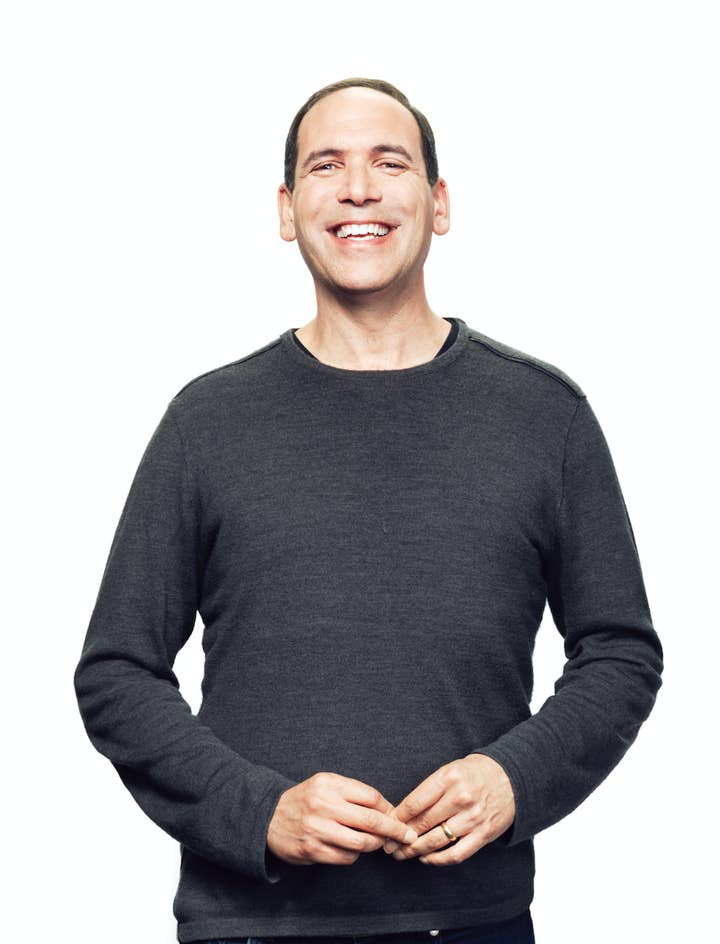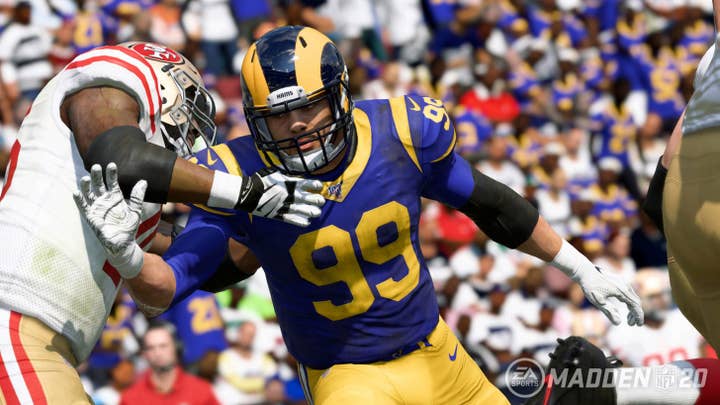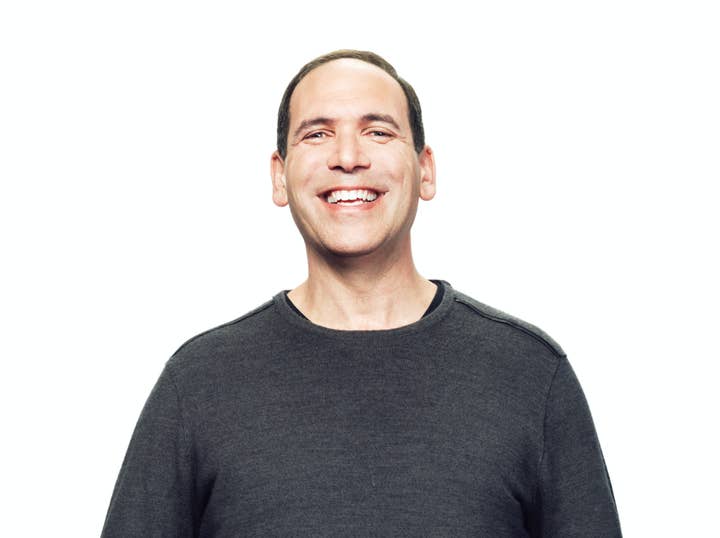EA: "Cloud gaming is going to bring in another billion players"
CTO Ken Moss on EA's huge investment in AI, cloud streaming and tech
Outside of Google, Xbox and PlayStation, there is another huge company taking major strides in the game streaming space.
EA's Project Atlas began testing in September, with FIFA 19, Need for Speed Rivals, Titanfall 2 and Unravel available to play across numerous devices. It is yet another platform to sit alongside Stadia, xCloud and PlayStation Now, which is why it was surprising to see EA's chief technology officer Ken Moss at Microsoft's X019 event to announce that several more EA titles will be coming to xCloud.
"We definitely do not see it that [we're competitors]," Moss tells GamesIndustry.biz. "That is really not our goal. We haven't announced exact next steps on what we're doing with ours. We are pushing it, but I view it as actually part of our strategy -- bringing our games out to the cloud and taking the learnings back to our studios, giving us the information on how we need to evolve our core platforms like Frostbite and our services platform and AI. That's what we are doing. We're not at all interested in competing on platforms."

Moss is a lifelong gamer, but has spent much of his career at major organisations such as Microsoft and eBay on non-games projects. However, the allure of the cloud drew him to the games business.
"I've seen it transform so many things and the opportunity in games is incredibly exciting and not really achieved yet," he says. "I truly believe that these forces -- cloud and AI -- will change just about everything in games. It's going to be a five or ten year journey for us, but I say that confidently. I don't even think that's a bold prediction.
"With streaming, our motivations are to be where the players are so that they can play our games wherever and however they want. Our actions are consistent with that. How cloud gaming evolves is uncertain right now, but it's going to bring in another billion players into the gaming world. We say we're at 2.6 billion or so right now. We want to make sure we're at the forefront, but also get the early learnings so we know how to change how we build our games in that world.
"Our partnership with Microsoft is a big deal. We're really excited that they are believers in cloud gaming and that they're pushing hard. Our own investment is also a big deal to us. They are helping us get very direct learnings. They're natural extensions of work we have done in the past with things like Origin. They allow us to have this direct connection with players, and frankly we're just scratching the surface. You should expect us to actually look to partner a lot more than we have in the past."
Although EA has the content for cloud gaming, and it's partnering with indie studios to bolster its own subscription catalogue, it doesn't boast the same cloud infrastructure as a Google or a Microsoft. But Moss says there is more to launching a successful game streaming offering than simply having the data centres.
"I truly believe that these forces -- cloud and AI -- will change just about everything in games... I don't even think that's a bold prediction"
"There's a broad spectrum of things you need in order to achieve this vision. You need to have right infrastructure, for sure. You need to have the software running on that infrastructure that knows how to do streaming. Streaming games is more complicated than streaming movies or music by an order of magnitude, and that software is really important. You need to have the experience so that it's good for players. And last, but certainly not least, you need to have the content.
"If you don't have all of that, you're probably going to struggle. So on the infrastructure side the players you mention are certainly important. We are not going to pick up a shovel and open data centres and start investing those kind of dollars, but there are a lot partnership opportunities where you can piece together all these different areas."
Although EA says the future direction of game streaming is uncertain, Moss believes that the subscription model will ultimately prove popular with consumers.
"We've seen in other forms of entertainment that cloud streaming has been most effective when partnered with the subscription model. When those two come together is when the magic happens in other forms of entertainment. We see the same thing happening in gaming. We've been pushing forward on the subscription front pretty effectively. We have our PC subscriptions, we have an Xbox one, and now we have a PlayStation one.

"We're in the learning phase. We've been in [subscription] for a few years now. We have over 200 games in our PC subscription. We've been able to study what kind of behaviours people have. That will help us figure out what games to make and what games to partner with. Today you need to buy a whole game and hope to like it. A subscription world view is that you're going to invest an hour and see if you want more. We are getting that learning. The truth is that people do like to play different games. Even hardcore fans of one franchise want to take a little vacation and try something else."
Game streaming is one area that excites Moss, but something that's even more promising -- although not quite so public -- is the impact cloud and AI will have on games.
"I'm super excited about [streaming], but it's actually one step on a journey. The main difference in cloud is not really that the CPU is sitting in a big building versus being in your living room; the main difference is now you can have dozens or hundreds or thousands or millions of computers that can do stuff to help power the game.
"The size of the world, the immersion of the world, the quality of the characters... That's where [cloud is] really going to transform everything in gaming"
"If you apply that to an actual game like Battlefield... DICE prides itself on amazing destruction. They blow stuff up better than anyone. But the simulations they do for destruction are very limited compared to what they would really like to do, because they have a certain amount of GPU and a certain amount of CPU and they have to do it in real time. If they could have a pool of servers up there that can be running our physics engine in Frostbite and be calculating better destruction, it can be like real life.
"And you can apply that not just to blowing things up. You can apply that to really every part of the game; the size of the world, the immersion of the world, the quality of the characters... That's where it's really going to transform everything in gaming."
Cloud and AI may enable significant technical advancement, but considering the escalating costs of AAA game development -- and with games taking longer to create -- it doesn't seem realistic for DICE to spend so much time and money creating explosions "like real life." Yet Moss says that this technology is being used to make development easier, too.
"If you take an example of creating a big beautiful world, you can apply automation to it, but you have to watch out so that you don't create a big boring world that's repetitive and has no personality. We are actually doing this as we speak, where either the computer creates the world -- or an AI -- and our artists and creatives create tools to empower our creatives to be ten times more productive, so they don't have the drudgery of creating the world but they have all the control.

"For example, you might have a world full of trees. The artist has decided that they want a lake over here, so they paint a lake in. But now the shoreline looks terrible. You have a tree sitting next to the lake that doesn't look at all believable. You've got rocks crawling with dirt right against the water where it would have eroded. We have tools now where you can paint in that water feature and AI runs in the background and terraforms the area around that lake, and it makes all of the sand, the dirt, the rocks, the trees behave according to the laws of nature.
"It does that work automatically and then the designer can say: 'That's not quite right, I want this rock over here' and they fine-tune it. It can make it ten times more efficient if we do it right. We see these opportunities for world designers, for gameplay designers, for character designers, for every part of the creating of games."
"We have an ultimate belief that the more iterations we can do on a game, the higher the quality is at the end."
Moss continues: "We are looking at running more and more of our game development in the cloud. By putting it up in the cloud, we enable a lot of interesting things -- collaboration amongst developers who may be in different locations or even sitting next to each other, but working on the same thing and they can see each other's work in real time. Even more mundane things like how do we distribute test builds around or how do we use the cloud to automate testing, so that we can find bugs faster, we can iterate faster.
"We have an ultimate belief that the more iterations we can do on a game, the higher the quality is at the end. If we can have the studios playing the game every single day and they can iterate, they can then use the time to polish, polish, polish. It is a challenge. It is absolutely true that if we don't stay on top of the rising expectations, then we won't be able to continue to make great games into the future."
Part of this will be in facilitating sharing among the various teams at EA, something it already tries to do with its Frostbite game engine. Moss says that each of the teams have created some unique technical advancement that the other studios can use, such as the animation work done by the FIFA team. EA also hosts regular Frostbite Dev Days to encourage sharing.
However, the firm has moved beyond working with just its own studios. Through EA Originals and EA Origin, the company is increasingly partnering with smaller publishers and indie developers. So with EA investing so heavily in cloud, AI, and technology in general, what's the likelihood of these partners benefiting from these developments, too?
"We are very focused on making sure that our collection of studios has the best tech and tools," Moss answers. "When we have programs where we have third-party developers working with us, they're using our shared tech. You spoke to Matt Bilbey [EVP of strategic growth, who leads EA's partnerships with indie developers], he is delighted. One of the reasons he said that developers come to us is that they want to get that help and we're eager to figure out how to help them more. This will evolve over time."
The job that Moss has set out to achieve seems overwhelming, with thousands of employees across multiple teams contributing to tech, tools, platform enhancements and even game streaming. It sounds like a logistical nightmare, but Moss is far from intimidated by the job.
"You say it sounds hard but I'm like 'No, that's actually why it's cool.' Gaming, and what we do, is like nothing else I've ever seen in the world. It's this perfect blending of creativity and technology. They have to be in balance. They have to be perfectly interlocked in order to make the magic happen. If it becomes too techy, you're not going to get the emotions or the fun. If it becomes too creative, it may not work and that won't be any fun because no-one will get to experience it. Creating this blend is hard work, but it's super fun to get."

